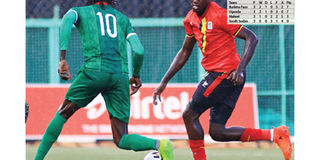Prime
What Cranes must fix in next 90 mins

Game on. Joseph Ochaya (right) reads Tito Okello’s moves during Thursday’s match. The Cranes wing-back is suspended for return leg. PHOTO/JOHN BATANUDDE
What you need to know:
Monday
- South Sudan Vs Uganda 7pm
- Malawi Vs Burkina Faso 6pm
The player ratings by this newspaper in the aftermath of Uganda versus South Sudan were not that flattering. It is the kind Cranes fanatics and the FA will treat as cynical.
Emmanuel Okwi 3, Elvis Bwomono 4, Khalid Aucho 4, and a handful of fives and sixes. Mike Azira, who conducted the midfield like an orchestra performance, picked seven.
In the end, it was the most important thing in the game that mattered. A win. And the Cranes are just 90 minutes away from a third successive Afcon finals appearance, thanks to Halid Lwaliwa’s 85th minute header that ended the resistance of goalkeeper Ramadan Mayik and the well-organised defence wall in front of him.

Goal hero. Halid Lwalira
“The match against South Sudan was largely like we expected,” admitted Cranes head coach Johnny McKinstry. “Genuinely, we knew, they would be a hard nut to crack.”
Perhaps, he is right. South Sudan’s recent results are synonymous with single goal margins.
At only 20, Mayik played with the confidence of the man between the sticks at the other end, Denis Onyango.
Cranes first half performance was abysmal. McKinstry admitted that “we lacked movement especially in the final third. We did not create much in the first half.”
So just what did the gaffer get wrong? He said there is a need to find a way to win and that the Cranes must expect another tough encounter in the return leg. So what were the hits and misses?
With two combative midfielders in Azira and Aucho at his disposal, a 4-2-3-1 system always looked the best especially when you have to play both Kizito Luwagga and Faruku Miya.
But then McKinstry chose to ring in Derrick Nsibambi on the right and pushed Okwi in the false nine position. Okwi has often thrived on the right or at least the wings cutting in with his darting runs.
On the other hand, Nsibambi, despite his work rate, is renowned for his aerial prowess. To play a striker who is good in the air wide on the flanks is to under utilise his talents, never mind that he is played wide at Egyptian club Smouha.
The challenge on Cranes then is that with Nsibambi on the wing, the system he thrives in at his Egyptian club would have to be deployed in the Cranes set up for the player’s potential to be realised.
What was strange even under the circumstance is that the Cranes made several attempts to connect with the back of the net via aerial deliveries to the striking line. Against the towering South Sudanese, this was simply expecting too much from Okwi and whoever else drifted into the box for the aerial duels.
Sure, the persistence paid off in the end seeing as Lwaliwa’s goal came from similar deliveries that the Bright Stars had for 84 minutes confidently put out of danger each time they were confronted.
Bayo’s power
Uche Mubiru Ikpeazu would have probably made his debut for the Cranes against South Sudan had it not been for the latest string of injuries he suffered.
McKinstry’s admiration of the Wycombe Wanderers towering forward is in the player’s size.
Ikpeazu, McKinstry believes, has the power and ability to hold off opponents and create space for team mates. It is easy to see how invaluable Ikpeazu would have been against the Bright Stars who ran their legs ragged, covering every blade of the synthetic fibres at St Mary’s Stadium, Kitende.
Most of the Sudanese players are not only tall but also have the power that kept the likes of Nsibambi looking paperweight. Against their compact style of covering every ball with two to three players, Ikpeazu could have proved the difference if he is all that McKinstry believes he is.
Yet even without the English Championship striker, the Cranes had Fahad Bayo all for themselves. On the bench.
Maybe the Ashdod striker lacks the experience in national colours compared to Okwi or Nsibambi, but Bayo’s temperament, pace and power could have counted for much against the Bright Stars.
Besides, Kitende has been his home. The artificial turf favours tall players who do not have to overstretch to reach possession and Bayo would have been that man. Added to this is his height would have balanced the equation against the Bright Stars defenders in those many aerial balls they effortlessly cleared.
Bwomono’s quiet first half
Many have observed that Elvis Bwomono hardly helped with attack like wingers ought to. It is down to how the team was set up. On the left, Miya and Luwagga often drifted inside, meaning Ochaya had space to overlap.
However, on the right, with Nsibambi not drifting inside as well as would have been expected, it created a block where any attempt to overlap would mean Bwomono is knocking straight into the crowded men in green.
McKinstry could tweak a few things to afford the full-backs more freedom to overlap and create confusion in the opposition defence. More than this, Okwi’s pace should be utilised on the wings.
[email protected]





